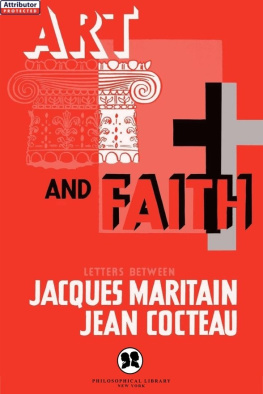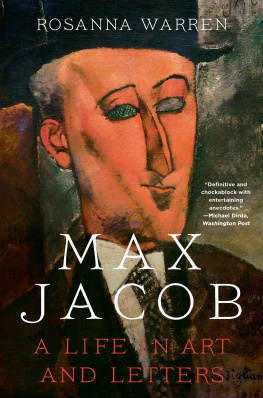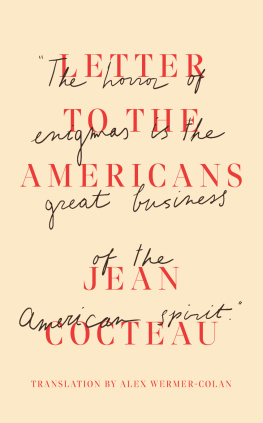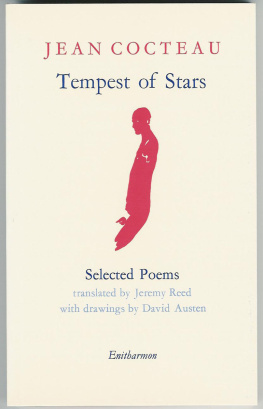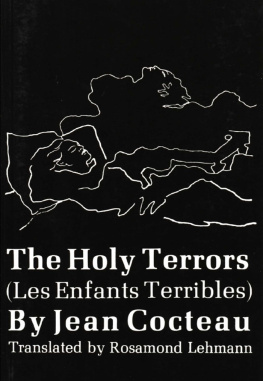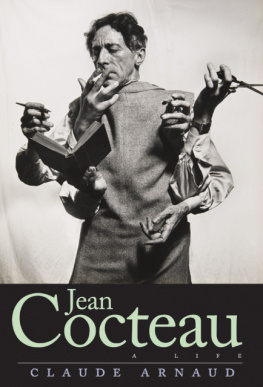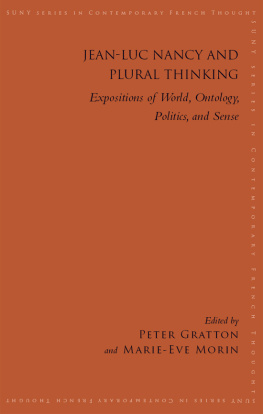Titles in the series Critical Lives present the work of leading cultural figures of the modern period. Each book explores the life of the artist, writer, philosopher or architect in question and relates it to their major works.
In the same series
Jean Genet
Stephen Barber
Michel Foucault
David Macey
Pablo Picasso
Mary Ann Caws
Franz Kafka
Sander L. Gilman
Guy Debord
Andy Merrifield
Marcel Duchamp
Caroline Cros
James Joyce
Andrew Gibson
Frank Lloyd Wright
Robert McCarter
Jean-Paul Sartre
Andrew Leak
Noam Chomsky
Wolfgang B. Sperlich
Jorge Luis Borges
Jason Wilson
Erik Satie
Mary E. Davis
Georges Bataille
Stuart Kendall
Ludwig Wittgenstein
Edward Kanterian
Octavio Paz
Nick Caistor
Walter Benjamin
Esther Leslie
Charles Baudelaire
Rosemary Lloyd
Jean Cocteau
James S. Williams

REAKTION BOOKS
For J.
Published by Reaktion Books Ltd
33 Great Sutton Street
London EC1V ODX, UK
www.reaktionbooks.co.uk
First published 2008
Copyright James S. Williams 2008
All rights reserved
No part of this publication may be reproduced, stored in a retrieval system, or transmitted, in any form or by any means, electronic, mechanical, photocopying, recording or otherwise, without the prior permission of the publishers.
Page references in the Photo Acknowledgements and Index match the printed edition of this book.
Printed and bound in Great Britain by
Cromwell Press, Trowbridge, Wiltshire
British Library Cataloguing in Publication Data
Williams, James S,. 1963
Jean Cocteau. (Critical lives)
1. Cocteau, Jean, 18891963 2. Authors, French Biography
I. Title
848.912
ISBN-13: 978 1 86189 354 3
Contents
Introduction:
The Living Artist and the Posthumous Work
When I write I disturb. When I make a film I disturb. When I paint I disturb. When I exhibit my paintings I disturb, and I disturb if I dont. I have a knack for disturbing I will be disturbing after my death. My work will have to wait for that other death, the slow death of my knack for disturbing. Perhaps it will emerge victorious, unencumbered by me, liberated, youthful, and shouting: phew!
Cocteau, Diary of an Unknown
In a short colour film made in 1958 by Jacques Demy and Jean Masson entitled Le Muse Grvin, Jean Cocteau staged a remarkable encounter with his own wax image. The wax figure of a mature Cocteau sitting across the table sporting a bow tie is presented by the real Cocteau as his Parisian alter ego, who receives the public honours but also takes the blows. If this fabricated double is false and hateful, it is because, as Cocteau puts it, the Parisians have turned me into a character I should not like to meet. Yet as always with Cocteau this is only half the story, for he claims also to be very grateful for this noisome false self who takes the heat in his place. He instructs the wax impostor to return to Paris on the evening train so that he can return in peace to his work. This is crucial to Cocteaus general concept of artistic invisibility, one that becomes a veritable obsession in his later work, according to which the Poets true self, that is, the autonomous writing self or Night, strikes a form of compromise with the public the fabrication of a false self in order to remain in safe obscurity and thus free from the trappings of celebrity. The message could not be more clear: the more visible the man, the greater the invisibility of the artist and the more authentic the work.
Putting aside for a moment the question of whether the solution proposed here can ever be that simple, the waxwork scene exemplifies Cocteaus supreme talents as a performer and his compulsive desire to stage aesthetically the drama of his own life. It also invites the question: who was the real Jean Cocteau? The Protean dancer on the artistic high wire, as he liked to see himself, inspired by the gravity- (and gender-) defying American trapeze artist Barbette, or an all-too-human contortionist desperately seeking to justify himself to others and to himself? Which is to say, the public extrovert or the private loner? For of all the many contradictions and paradoxes that define Cocteau, none is perhaps more striking than the fact that his prodigious output in virtually every artistic field and medium betrayed a fragile and lonely man wracked by self-doubt and feelings of alienation. Within the space of a sentence he could swing perilously from self-promotion to self-pity, from self-denigration to self-defence, from self-expansion to self-annihilation. What was rich duality one moment could be internal division the next, and the reader is made either complicit or reversed into the enemy accuser VOUS , subjecting him to yet further trial and humiliation. As the wax scene suggests, there is with Cocteau a very thin line between self-castigation and public accusation that was all too real. For having appeared during the late 1910s and early 1920s the very incarnation of the moderne and the quintessence of French wit and elegance (Edith Wharton once memorably described Cocteau as a man to whom every great line of poetry was a sunrise, every sunset the foundation of the Heavenly City), he experienced a rapid fall from grace, dismissed as a social chameleon, plagiarist and crude effect-seeker, a producer of mere cocktails. For many he was an all-performing dandy of unbearable lightness, a touche--tout sublime or sublime Jack of all trades, an uncommitted aesthete blessed with the talents of a polymath and the instincts of a dilettante. In particular, he was deemed frivolous for diversifying in too many different art forms (the French adjective versatile, applied to Cocteau, carried a particularly negative charge). For those left struggling to keep up with Cocteau artistically, he was simply the joker in the modernist pack, more sham than shaman. Andr Breton regarded him with particular homophobic virulence as an affront to artistic manhood, and with his Surrealist troops attempted to sabotage every project in which Cocteau was involved. The situation was not helped by his highly public personal life: what passed as alternative and glamorously bohemian in his own immediate circle began to seem to outsiders merely decadent, and the whiff of scandal in particular drug-taking and the charge of corrupting young men never left him. With some justification and just a hint of paranoid megalomania, Cocteau considered himself the most hated and persecuted man in all France. Despite the astonishing range and scale of his artistic achievement, the result of almost 60 years of uninterrupted creative activity at the intersection of the major artistic and intellectual currents in Europe (at least up until the 1940s), he lived to see himself become one of the most underrated and outmoded figures in twentieth-century French literature.
Certainly there is always some collateral damage when an artist invests so much of himself in his work, yet to be Jean Cocteau Cocteau paid an unusually heavy price. It was not just his persistent poor health, exacerbated by long years of opium use, which necessitated seven separate treatments for detoxification. Cocteau put himself continually on the line, at once consumed by the world and consuming others in order to gain greater self-consistency and weight. He lived a perpetual identity crisis and by his own admission experienced continual anguish and turmoil, from the moment of his fathers suicide when he was just nine to the tragic early deaths of his closest male friends and lovers. He experienced a profound need to identify and fuse with others simply to exist: I love others and exist only through them, he explained. A chosen or conscripted other positioned as either Master or Muse or Mentor offered the possibility of restoring a sense of identity, which he felt to be lacking due to an insurmountable difficulty of being, the title of his crucial collection of biographical essays of 1947. So completely did Cocteau define himself through others that he would absorb them even to the point of mimeticism, giving rise to an awesome ability to imitate others mannerisms. The success of such performances was inevitably short-lived and provoked an unsatisfiable desire for plenitude. At times he felt himself to be literally


